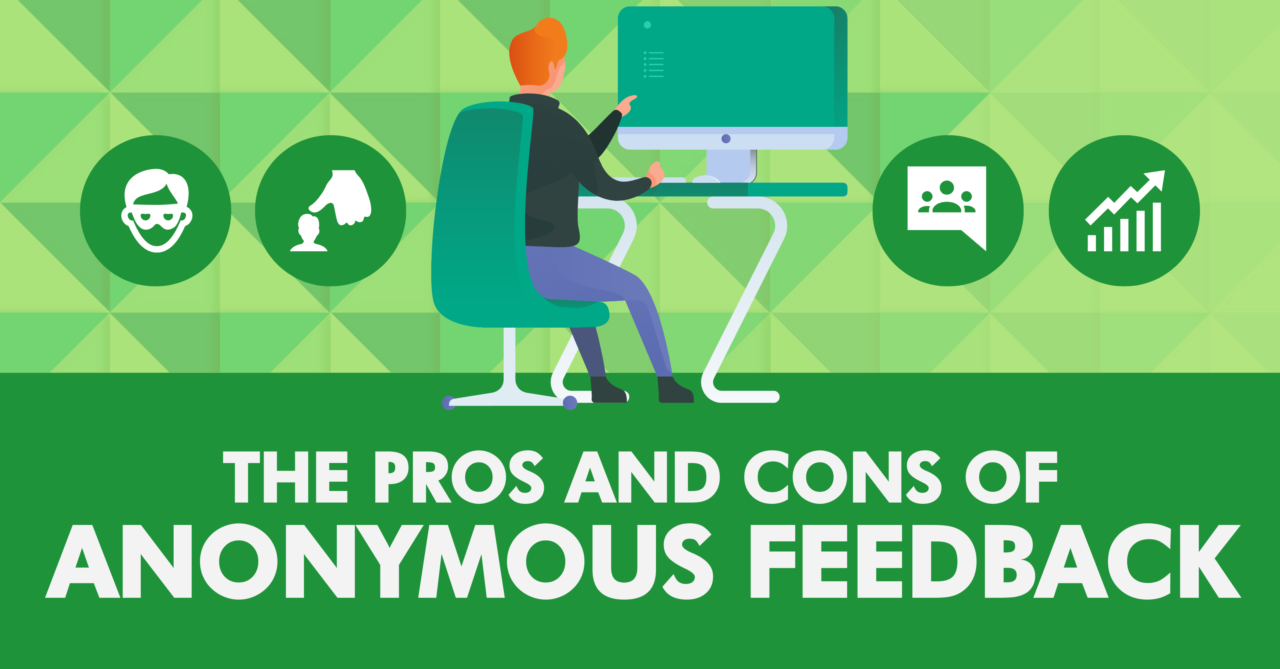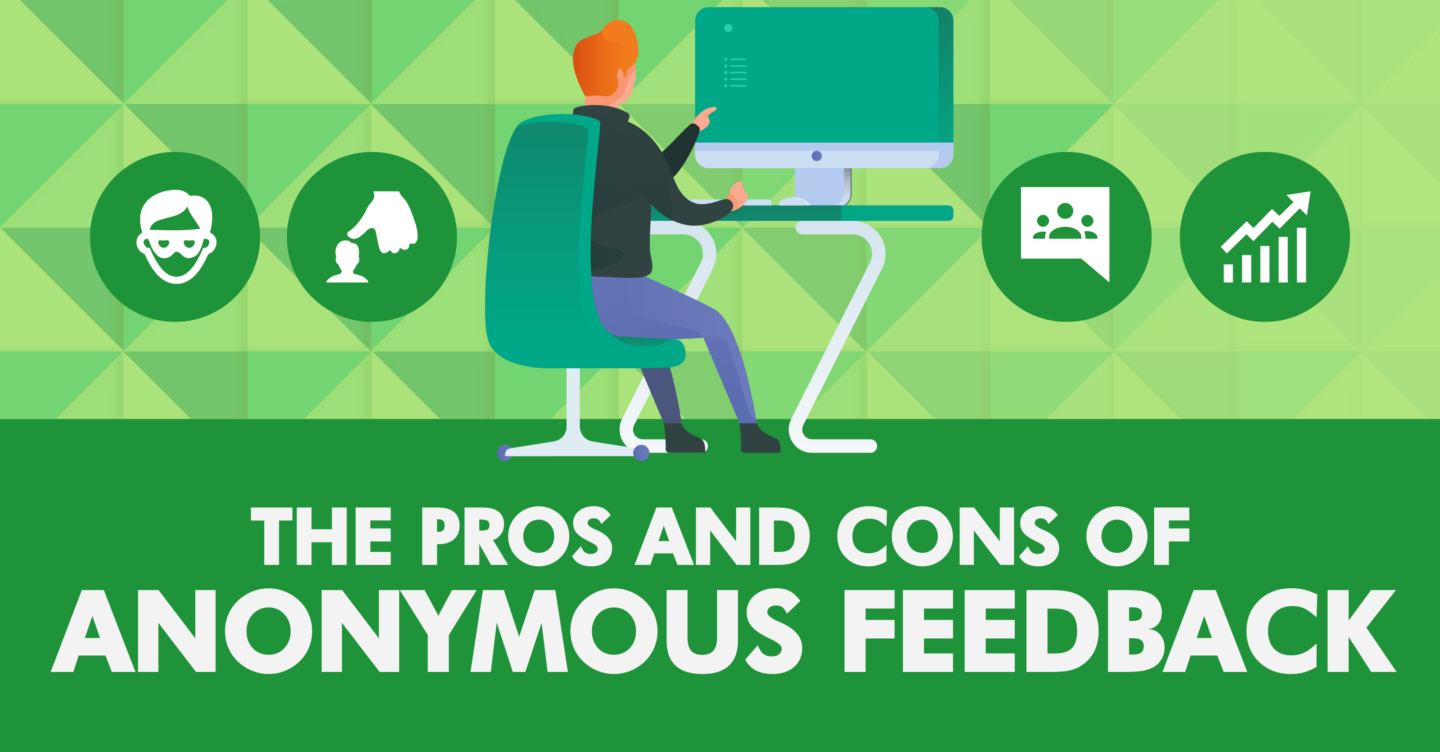
The Pros and Cons of Anonymous Feedback
The value of employee feedback is indisputable, and any manager will attest to it being an integral tool throughout business processes such as project management and business innovation. When it comes to understanding how employers go about collecting that feedback, however, and how they have chosen to best manage its collection and leverage its results, the advantages and drawbacks of anonymous feedback become more apparent.
The Disadvantages of Anonymous Feedback
Feedback is a vital part of any organization’s operations, with regular feedback results driving leadership and a company culture that remains lean, innovative, and high-performing. But the benefits of keeping feedback channels anonymous can sometimes be outweighed by the potential detriments it can have on your employees.
The primary reasoning behind the push for anonymity is the elimination of the power dynamic that exists between the givers and receivers of harsher feedback. However, when anonymity is introduced and becomes the norm for feedback giving, the providers of that harsher feedback are usually much less specific, since details may risk them revealing their identity. The absence of context when it comes to providing feedback can undermine a company’s push for innovation and growth, since it discourages learning, openness, courage, and adaptability.
Listed below are some other possible drawbacks of implementing an anonymous feedback system.
1. Encouraging Dismissive Rationalization
Even the most impartial and selfless candidate is not immune to thinking about their self-image when it comes to constructive criticism. It is extremely common for harsher criticisms to be minimized almost intuitively by their receiver.
For example, if the source of feedback is someone you don’t think highly of, you may inherently minimize whatever it is they present to you. However, in these cases you can recognize rationalization and work past it to digest the truth. When the feedback is anonymous, it is much harder to develop that counter-narrative to dispute the instinct to dismiss whatever is being said. In order to increase congruence with how we perceive ourselves, we leverage the lack of context that comes from anonymous feedback to discount it entirely, and no learning can be done.
2. Promoting Mistrust
When constructive feedback is received anonymously, it is not uncommon for it to be met with disbelief and a questioning of the motive behind it. Without a clear sense of the source, employees and employers alike may jump to conclusions about why the feedback is constructive in the first place, including beliefs that may lead to mistrust among the workplace like the perception of intentional sabotage. Even when the constructive feedback is minor, its anonymity can still have the receiver thinking more about the source and why it couldn’t be shared in person, resulting in a gradual decrease in openness and trust.
3. Delusions of Grandeur
Just like critical anonymous feedback can be treated too trivially, positive anonymous feedback can be treated with too much significance. When someone receives positive feedback or praise, they are likely to elevate it as an accurate definition of who they are, telling themselves it is entirely correct. When this happens, the opportunity to adapt and grow further is lost, since the receiver of the feedback thinks they have reached their highest potential.
4. Decreasing Moments of Encouragement
Not only does positive anonymous feedback rob the receiver of a valuable learning opportunity, it also steals the chances for meaningful moments between colleagues to occur where they can openly encourage one another and have positive interactions. Dialogue amongst team members, as well as between an employer and employee, about their respective strengths can have tremendous effects for the organization. Anonymous feedback removes that opportunity, blocking off the channel towards success that is supportive relationships.
The Benefits of Anonymous Feedback
While anonymous feedback may not be the best fit for some organizations, it does not mean it is all bad, or only has negative results for business. In some cases, implementing anonymous feedback may be the best option when it comes to internal assessments.
One of the largest arguments when it comes to the advantages of having anonymous feedback in place, is its potential to eliminate the internal struggles employees and employers undergo when they are forced to analyze and comment on someone’s actions. Feedback should be mutually beneficial for the receiver and the provider, but it has negative connotations for several different reasons, including:
- The fear of being judged. The need to be liked is not exclusive to team members’ personal lives. People want to be liked and appreciated in their workplace, and especially by their supervisor since they hold ultimate power over their career and financial security. When feedback is not anonymous, people who hold high expectations for themselves and who worry about how their supervisor will perceive them can struggle significantly in overcoming that mental block and speaking their mind about certain issues.
- The fear of losing your job. Similarly, an employee shying away from face-to-face feedback can be considered a form of self-preservation. By abstaining from sharing something that may be perceived as wrong to someone in a position of authority, they believe they are protecting themselves from a potential blow to their career or a suspension altogether. Although it is extremely unlikely for an employee to actually be fired over constructive feedback they provide to their superiors, people still register it as a risk, and play it safe rather than contributing in such a way that may harm their financial security.
- The fear of being ridiculed. While some employees may worry about face-to-face feedback in the context of being disliked or fired for what they say, others simply worry that the feedback they want to provide will fall short of expectations. Just like the fear of being judged, the fear of being ridiculed is hard-wired into everyone. Social rejection is scary, with employees taking great care in how they choose their words so as not to be rejected by the people around them. This includes withholding potentially valuable constructive feedback.
These mental barriers can seriously hinder the value a company can yield from their feedback process. When the providers of feedback are in the face of distinct mental obstacles, some of which are near impossible to eliminate, the results are inherently inferior than if the providers had said what was truly on their minds. Anonymous feedback provides employees the freedom to criticize and express their opinions without having to face those mental blocks, getting at the truth of their sentiments. And, when truth is at the forefront of feedback, managers can leverage that information to genuinely improve their workplace and drive better performance.
Listed below are the key advantages that come from implementing anonymous feedback into your workplace.
1. Employees Expressing Themselves Freely and Providing Valuable Insights
If an employee can say what they truly mean and provide honest and constructive feedback without the fear of being judged, ridiculed, or labelled, they have no reason to not contribute to the improvement of their team or project. When non-anonymous feedback is the only feedback form available, only the superficial and non-threatening issues that affect the workplace will be mentioned, leaving the most important, underlying, and potentially uglier problems left unsolved.
Feedback exists to improve the overall quality of a company in order to keep driving it forward. If the more controversial, important issues are not addressed as soon as possible, a company risks cultivating an unhappy workspace riddled with conflict and a lack of productivity. Anonymous feedback is the perfect channel to reign control over those key issues, since the person who brought it to your attention is no longer the focus, but its resolution is. That honest insight is a valuable asset for any leader.
2. Building Trust
Anonymous feedback has the potential to empower both employees and employers alike. While the potential risks that this emboldening could have should be considered, the subject pool is not necessarily one that is privy to rampant dishonesty or bias. At the end of the day, they are your team, a group of mature and responsible employees who can, and should be able to, express their opinions on the business freely.
We have already discussed the risk that anonymous feedback has in promoting mistrust, but when leveraged correctly, it can actually have the opposite effect. Employees may perceive a forced non-anonymity as a lack of trust the employer holds in them, which will only secure those aforementioned mental blocks as opposed to eliminating them. Anonymous feedback channels can demonstrate to them that you trust them not to abuse the opportunity, and to provide feedback that is genuinely constructive, helpful, and as unbiased as possible.
Anonymous Feedback: A Yes or No?
The value of feedback is indisputable, but the implementation of anonymous feedback is highly debated amongst HR professionals. However, while it can potentially pose several risks for the effectiveness of the process itself, anonymous feedback is more often than not a key feature that is valued by the majority of companies.
The data an organization can receive from anonymous feedback, versus non-anonymous, is significantly more beneficial. Real issues rarely come up consistently in non-anonymous feedback reports, but in anonymous feedback reports, managers receive genuine, constructive insights that they can use to improve the overall work experience of their team. When feedback is kept anonymous, employees are much more inclined to be truthful in their reporting, sharing valuable information and providing actionable observations and suggestions.
There are several different ways to incorporate anonymous feedback into your organization’s assessment process, with SpriggHR seamlessly integrating optional anonymity into its Continuous & 360 Degree Feedback Tool.




